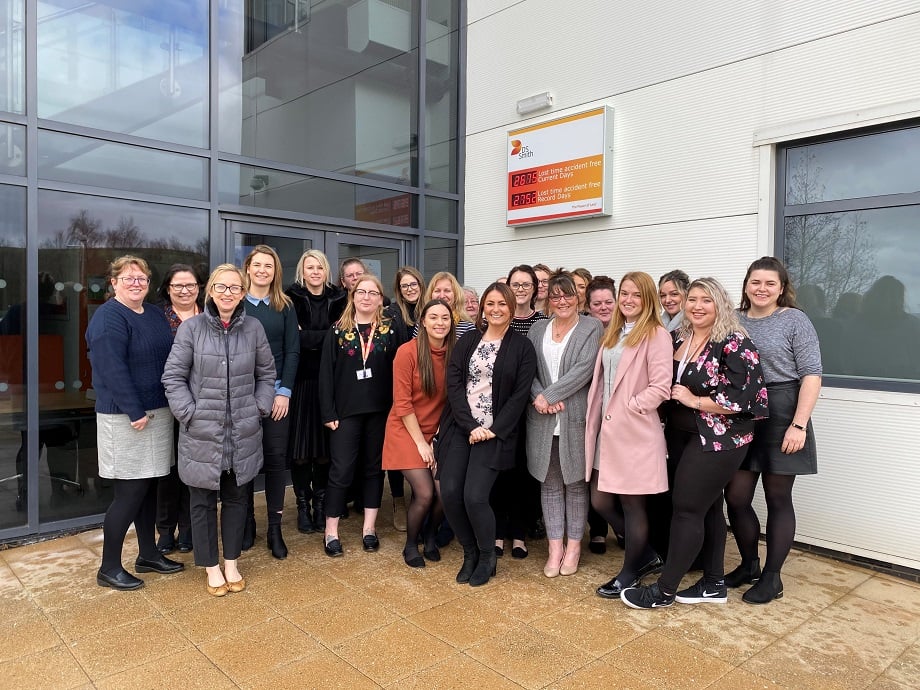International Women’s Day: What it’s like in the Paper and Recycling Industries
International Women’s Day takes place on 8 March 2020, with the theme ‘#EachforEqual - an equal world is an enabled world.’ To mark the occasion, we spoke to some of our employees to find out more about having a successful career in the paper and recycling industry.

At DS Smith, we pride ourselves on being a responsible employer, and we work hard to implement a fair and equitable business.
Our latest report shows the need to encourage more women into jobs in the manufacturing industry. We have increased the recruitment of female graduates in our ’One DS Smith Graduate Programme’ by 50%, increased the number of women participating in our new Global Leadership Programme from 9% to 31%, and ensuring everyone can reach their full potential by removing any barriers through unconscious bias workshops across senior management.
We are keen to take a leading role in promoting training, recruitment and networking opportunities to enhance the gender diversity of our workforce and to promote inclusive work practices.
To find out more about our women in the manufacturing industry, we interviewed Esperança Melo, Agata Krauz, and Rebecca Price, who work for DS Smith’s Paper and Recycling Divisions, about their experiences in the sector.
The Role of Women in Our Sustainable Development, Work and Community
What’s your experience of gender equality in the Paper & Recycling industries during your career?
Esperança: When I started my career 15 years ago, I felt like one of the only women in the sector. It was a male-dominated industry, and at first, the men struggled to adjust to a female presence - it was all new to them after all. Because of this, I was determined to add value and transform colleagues’ ways of working. Now, I feel comfortable, equal, and have the same opportunities given to me as my male counterparts.
Agata: The industry has changed massively in recent years and is still evolving today. The area is becoming more appealing to women as a career path, in which they can influence positive transformations. Throughout my journey with DS Smith, I’ve always felt supported, challenged and treated equally – they’ve given me the opportunity to grow and progress as an expert in my field.
Rebecca: When I finished school, I had no concerns that my gender would impact my career, and since joining DS Smith, I’ve been offered the same opportunities as my male colleagues. IT is typically a male-dominated profession; however, both my Line Manager and the team have supported my progression in the company.
Is there anything you’d change in the Paper & Recycling industries to achieve greater gender equality?
Esperança: Misconceptions about the roles of men and women in the workplace have been instilled from generation to generation - the challenge is changing this mindset. Historically, one of the biggest obstacles for women has been accessing equal education, something which has shifted in recent years – women now outnumber men at universities all over the world.
Agata: I think more focus needs to be placed on industry awareness and appeal – if women were more familiar with the range of opportunities in the industry, they’d be more likely to engage. Businesses should encourage female role models at all levels to inspire and motivate progression. Not only that, teams with greater gender diversity have more fluid dynamics, opinions, and creativeness.
Rebecca: An important aspect of promoting gender equality is the empowerment of women. Women should be encouraged and supported through progression into more senior roles alongside men. It is important that there are female as well as male role models within the industry. Allowing women to work where their strengths lie ensures companies will have a more diverse skillset.

Do you have any advice for women who are interested in working in the Paper or Recycling industries?
Esperança: Stay true to yourself, trust your value, and be confident – everything else will follow naturally. Gender is not a fuel for success, but hard work and dedication are.
Agata: I’d always encourage women to consider the paper and recycling industries due to the many career paths available. Project confidence, work hard, and never be afraid to share your ideas and opinions.
Rebecca: Working in the Paper & Recycling industry is a positive experience and I have not experienced any difficulties whilst in the industry. I would encourage more women to join the Paper & Recycling industry as it is an interesting field to work within as well as extremely important for the future of our planet.
How do you see the future of gender equality in the Paper & Recycling industries?
Esperança: So much has changed during my career; however, there is still progress to be made. A better understanding of men and women in the workforce will mean we can get the best out of everyone. This will create a robust industry and ensure we are approachable to all of our customers too.
Agata: The sector is still maturing - in time, we will see more and more women choose the world of paper and recycling.
Rebecca: Given the opportunities available, I see more women taking on roles within the industry. Companies should continue to challenge stereotypes and promote gender equality, recognising individuals who have the best knowledge and skills for the job, regardless of their gender.

A People-Focused Approach to Recycling
At DS Smith, our most valuable asset is our people. The individuals we employ help us to lead the way in sustainability, tackling some of the world’s most pressing issues surrounding climate change. This alone requires a modern, dynamic workforce that looks to the future to solve our customer’s key challenges.
Everyone should be able to realise their full potential at DS Smith. We are working hard to ensure stronger diversity throughout our business and to support programmes and initiatives to drive this philosophy.


